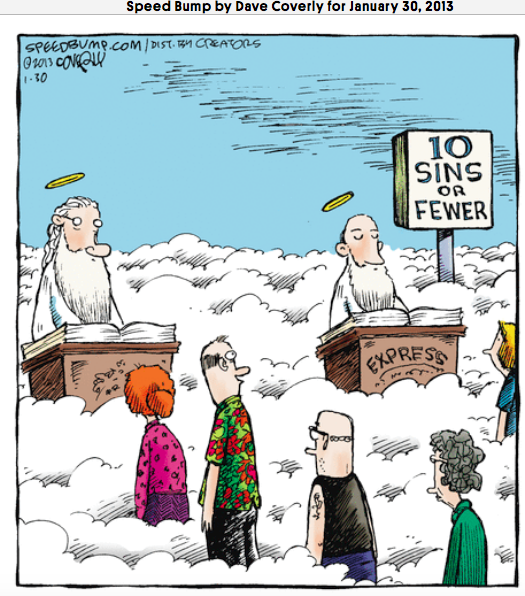We are familiar with the ‘express checkout lines’ at supermarkets and elsewhere meant for those with fewer that a certain number of items. People who violate this rule can arouse a great deal of hostility. Some violate the spirit of the rule by claiming that multiple items of the same product should count as one. But there is a difference between ten cans of tuna and ten bananas in a single bunch. Most people would think that the former consists of ten items and the latter one item. But what if you have ten bananas in two bunches? Should that be considered one item or two? Would it matter if the two bunches are weighed and rung up separately or both placed on the scale at once and rung up as a single item.
This is of course, an example of a ‘first world problem’, an utterly trivial problem that few have the luxury to care about.
But I was thinking about that with this cartoon.
Should multiple occurrences of the same sin be counted as one? It is possible that Catholic theologians have considered this because it is in that religious institution that listing of one’s sins to a priest during confession is a requirement.


In Catholicism, sins are forgiven subject to the appropriate rituals having been carried out.
So the relevant issue at hand in that theology is the number of unforgiven (outstanding) sins (themselves categorised into venial and mortal), not the total number of sins.
PS One can also build a “slush fund” to cover the venial sins that may have accrued between the last confession and death. Neat, eh?
John Morales@#1:
So the relevant issue at hand in that theology is the number of unforgiven (outstanding) sins (themselves categorised into venial and mortal), not the total number of sins.
Not that I am casting you in the role of “defender of the faith” but that sure sounds like moral relativism to me.
I feel the need to take issue with your characterization of the express lane conundrum as a “first world problem.” My issue is not with this problem not being of the “first world,” which it clearly is, but in describing it as an “utterly trivial problem that few have the luxury to care about.”
Being a member of the 99% myself, a married, median-ish income working professional, I see this as yet another indignity foisted upon the working masses by the moneyed elites. The über rich, who’ve never had cause to set foot in a retail establishment, come up with these schemes to make just a little more money at the expense of the commoners, who will have no choice but to suffer through it. The additional wait times we endure — after working more hours than our soul-crushing jobs pay us for — often comes amidst suffering through a long list of other indignities we’ve already endured, like time-consuming commutes in an outdated car while we collect our kids from daycare (which assesses additional charge for tardy pick-up). The stop at the local grocery store, made a little worse since last time, just adds more straw to the camel’s back.
Marcus at #3.
Just to be difficult, maybe it’s more like the number of active infections your immune system hasn’t finished dealing with. Meas;es is no longer a problem for me, I had it and recovered back in the 1950s. The damn chicken pox virus may be a problem for me in the future as shingles.
The point of the fast lanes is to decrease the average wait time. It’s a crude way of implementing a priority queue; imagine you have two customers, one with 100 items and one with 1 item. If each item takes 1s, then the order surely matters; if the 100-item person goes first, the average wait time is (100 + 101)/2 = 100.5s. If the 1-item person goes first, the average wait time is (1 + 101)/2 = 50.5s. You can image if you had ten 1-item people and one 100-item people, the tradeof is: make 10 people wait 100s, or make one person wait 10s?
With that in mind, the “whether multiple items or not” shouldn’t matter--it’s how many scans need to be performed. At the self-checkout at my grocery store, I only scan one lime and then enter the quantity. This takes less time that scanning 15 limes. Banana bunches require one scan, so they are one item. Two banana bunches require two scans, so they are two items. Five tubes of toothpaste require five scans, so they are five items.
I suppose ideally, the “number of items” is only a surrogate for “time spent doing checkout,” and so a better algorithm would take into account ease of scanning, speed of the person scanning, etc. I hate making people wait behind me so I always do everything as fast an efficiently as possible, but I constantly see people casually moving items one at a time from their cart, stopping momentarily to reel their unruly children in, looking at their phones, etc.
I was raised Catholic, and while I believed I didn’t worry too much about minor sins (which are all I ever committed as a child) as long as I faithfully went to weekly confession. However, as an adult atheist, I inadvertently helped a good friend mislead his wife into thinking we were having an affair. I never did figure out how to atone for it; why on earth would she believe anything I might say? She died early this year, so I’ve lost my chance. But I still feel bad about it.